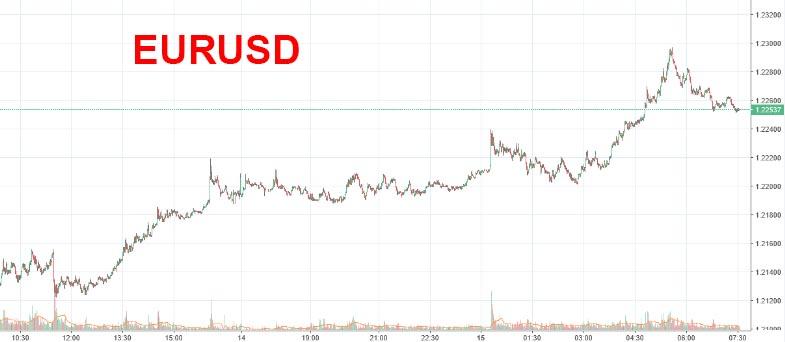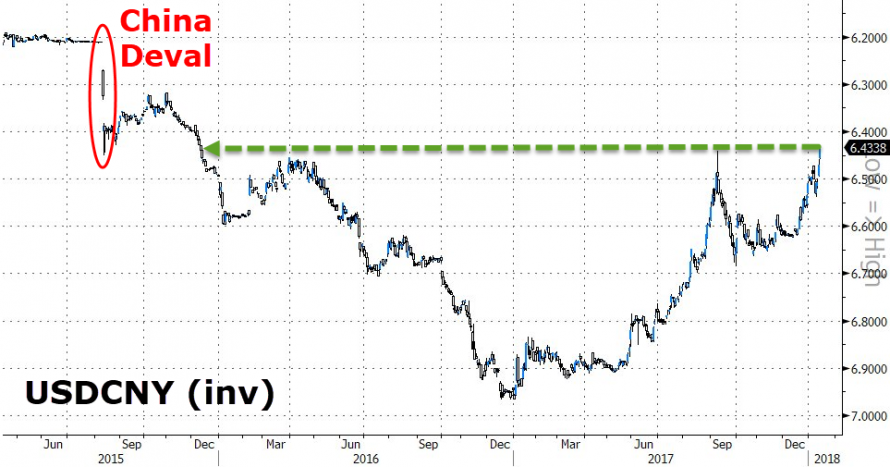With US markets closed for holiday, it has been a quiet, low-liquidity European session, with Asia similarly subdued, while continued USD weakness, now in its 4th consecutive day, has been the main focus as Bloomberg’s dollar index approached its lowest level in three years, helping push the euro up to its strongest since 2014.
Indeed, in lieu of active equity markets, it’s been all about FX and the tumbling dollar and overnight the EUR/USD rose to a new three year high just shy of 1.23 before easing off, while cable briefly rose above 1.38 – its highest level since Brexit – and the Mexican Peso was well supported by an unconfirmed Axios reports that was Trump softening his stance on Nafta, at least until Reuters denies it.

The Euro was boosted by growing expectations of tighter monetary policy from ECB, while the chance of a pro-European Union coalition in Germany also boosted confidence in the continent.
“The latest leg up in the euro has clearly come from optimism that the German government is moving towards an agreement for a coalition government,” said Investec economist Victoria Clarke.
The SPD’s pro-European stance – leader Martin Schulz recently argued for a “United States of Europe” – also strengthens the case for investment in the euro.
“This follows an earlier move triggered by the crucial line in the ECB account which has got people thinking about when the first move on rates will happen,” said Clarke.
Euro zone money markets now price in a 70 percent chance of a 10-basis-point rate increase by the ECB by the end of the year, up from 50 percent a week before.
As Bloomberg notes this morning, “the dollar remains under pressure after capping five straight weeks of declines, even against a backdrop of solid U.S. growth. Traders appear to be more excited by potentially hawkish policy shifts from central banks in Europe and Japan, by the improving political outlook in the euro area, and by the synchronized nature of global expansion that’s also propelling emerging-market economies.”
The strength in the euro pushed European stocks a touch lower, as exporters were hit by the currency strength. Europe’s Stoxx 600 Index was down 0.1%, but still not far from multi-year high hit last week, even after advances in Asian stock markets, as the common currency provided a headwind to the region’s exporter-heavy gauge. The yuan touched a two-year high as the People’s Bank of China raised the currency’s fixing to the strongest since May 2016.

European equity markets have started the week in negative territory, taking a breather after the gains seen since the start of the year with the DAX underperforming due to exposure of currency-sensitive stocks amid a surging EUR/USD. The UK construction and management company Carillion was in focus after the company was forced to go into voluntary liquidation as talks to rescue the company failed and trading in their shares was suspended. Serco shares rallied over 3% as markets bet that the company should be able to benefit from the collapse of Carillion, while Carillion supplier Speedy Hire fell over 10%. GKN shares have started the week positively after reports that they are considering spinning off a unit to fend off takeover interest and as Melrose said it’s planning to meet with shareholders following their rejected takeover offer.
Over in Asia, the MSCI Asia Pacific Index increased 0.6% to the highest on record with the largest climb in more than a week, even as Hong Kong’s Hang Seng index posted its first drop after a record 14 days of increases although the benchmark equity index erased a gain of as much as 1% as some of the biggest gainers over the past 12 months tumbled Monday afternoon. The Hang Seng closed down 0.2% after earlier climbing above its record closing high earlier; the index had climbed in the previous 14 sessions, its longest run on record.













Leave A Comment